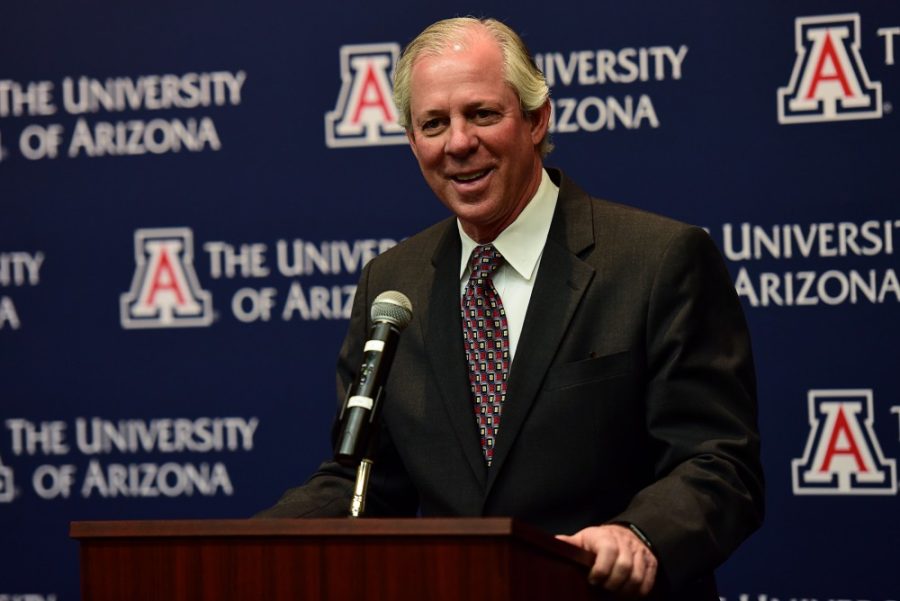PHOENIX—Dr. Robert C. Robbins has been named the finalist for the UA presidential job by the Arizona Board of Regents today during a press conference at UA’s Phoenix Biomedical Campus.
The regents voted unanimously to select Robbins for the job.
“I feel a little bit like the Patriots in the Superbowl.” Robbins said about his selection. “But thanks to that shoestring catch, I’m here.”
The current UA president, Ann Weaver Hart, announced last June that she would ask the regents not to renew her contract when it’s up in 2018, prompting the national search. The regents hired R. William Funk & Associates, an executive search firm specializing in higher education, to assist in the search.
The announcement comes after the regents met in a day-long closed interview session with both Robbins and the other finalist for the job, Sethuraman “Panch” Panchanathan.
Regent Ron Shoopman said the contest between Panchanathan and Robbins was “razor thin,” but in the end, it was Robbins’ CEO experience that really set him apart.
“He brings that experience of engaging globally that we think will really set him up to lead the university to the next level, not that the other candidate wouldn’t have done equally as well,” Shoopman said.
Robbins, who’s leaving a job as president and CEO of the Texas Medical Center, is scheduled to visit the UA campus on Wednesday, March 8, for an official visit and public forum. The visit will be the first time UA’s next president formally meets with representative groups from the UA campus community, including student leaders, faculty groups, deans and elected officials, according to a regents press release. There will be a moderated public forum that evening from 4:15 – 5:30 p.m. in the ENR2 building for members of the public to ask Robbins questions.
Robbins said his top priority at the university will be engaging with the students—something his predecessor has been criticized for.
“I think the world’s changing and education is changing, and I look forward to being a part of that change to provide students with better ways of getting knowledge in this ever changing and rapidly changing world,” Robbins said. ” … We’ve got to be as the university family—we’ve got to treat each one of [the students] like our own children and help them be prepared for not just the four years they spend on the campus but the next 40 years of their lives.”
Robbins also listed attracting education funding from the statehouse as one of his top priorities, calling it “probably the most important investment the state can make.”
He said the UA can work to be a more fiscally responsible steward of the student’s tuition dollars and the university’s allocated resources. He also mentioned a desire to diversify the UA’s sources of income outside just relying on state support.
The process of the search that identified Robbins as the UA’s presidential finalist has come under question by legal experts in the past month for it’s secrecy and closed-door policy. Those experts cite a 1991 Arizona Supreme Court case that outlined when a candidate’s resume and personal information becomes public information. In 1991, the regents were forced to hand over the names and resumes of 17 candidates. This year, only two were made public—Robbins and Panchanathan.
The search guidelines outlined by the regents is carefully worded so that applicants will remain confidential until the end of the process, tweaking the definition of “candidate” and “interview” to remain in what the regents argue is in the purview of the ruling.
“Obviously, I think that [the regents are] completely wrong on the law,” said Derek Bambauer, a UA law professor in a previous interview with the Daily Wildcat. “The [Arizona] Supreme Court set out the rules for what constitutes a prospect, candidate and finalist, and it’s not up to [the regents] to unilaterally redefine that.”
The regents will convene once again on Monday, March 13 to formally finalize Robbins as their selection for UA’s next president, and from there the chair of the board will begin contract negotiations. They will meet a final time on April 6 to vote on the proposed contract.
Follow Sam Gross on Twitter.









